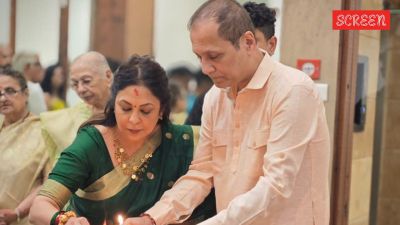In their first meeting after the return of the BJP-led NDA to power, External Affairs Minister S Jaishankar and Chinese Foreign Minister Wang Yi agreed Thursday that the “prolongation of the current situation in the border areas is not in the interest of either side”.

The Indian statement, following the meeting of Jaishankar and Wang on the sidelines of the summit of the Shanghai Cooperation Organisation (SCO) in Kazakhstan capital Astana, said the “Line of Actual Control must be respected and peace and tranquillity in the border areas always enforced.”
The new element in the statement reflects the realisation that the border situation is not in each other’s interest and that tranquillity must be “always enforced”.
They also agreed to redouble efforts through diplomatic and military channels to resolve the remaining border issues in eastern Ladakh.
In a post on X, Jaishankar said, “Met with CPC Politburo member and FM Wang Yi in Astana this morning. Discussed early resolution of remaining issues in border areas. Agreed to redouble efforts through diplomatic and military channels to that end.”
“Respecting the LAC and ensuring peace and tranquillity in the border areas is essential. The three mutuals – mutual respect, mutual sensitivity and mutual interest – will guide our bilateral ties,” he said.
Story continues below this ad
The Ministry of External Affairs said the two Ministers had an in-depth exchange of views on finding an early resolution of the remaining issues along the LAC in eastern Ladakh to stabilise and rebuild bilateral relations.
“The two Ministers agreed that the prolongation of the current situation in the border areas is not in the interest of either side. EAM highlighted the need to redouble efforts to achieve complete disengagement from the remaining areas in Eastern Ladakh and restore border peace and tranquillity in order to remove obstacles towards return of normalcy in bilateral relations,” it said.
“He reaffirmed the importance of fully abiding by relevant bilateral agreements, protocols, and understandings reached between the two Governments in the past. The Line of Actual Control must be respected and peace and tranquillity in the border areas always enforced,” the MEA said.
It said the Ministers agreed to continue and step up meetings of diplomatic and military officials of the two sides to take forward their discussions to resolve the remaining issues at the earliest.
Story continues below this ad
“To that end, they agreed that the Working Mechanism on Consultation and Coordination on India-China Border Affairs (WMCC) should hold an early meeting. EAM reiterated that India-China relationship is best served by observing the three mutuals – mutual respect, mutual sensitivity and mutual interests,” it said.
They also exchanged views on the global situation. Jaishankar, the MEA said, extended to Wang India’s support for China’s Presidency of the SCO next year.
Reading the Prime Minister’s statement at the SCO meeting, Jaishankar said the SCO is a principle-based organisation, whose consensus drives the approach of its member states.
“At this time, it is particularly noteworthy that we are reiterating mutual respect for sovereignty, independence, territorial integrity, equality, mutual benefit, non-interference in internal affairs, non-use of force or threat of use of force as a basis for our foreign policies. We have also agreed not to take any measures contrary to the principles of state sovereignty and territorial integrity,” he said, in an oblique reference to China’s aggression in the border areas.
Story continues below this ad
Targeting Pakistan and its promotion of cross-border terrorism, he said, “While doing so, priority must naturally be given to combating terrorism, one of the original goals of the SCO. Many of us have had our experiences, often originating beyond our borders. Let us be clear that if left unchecked, it can become a major threat to regional and global peace.”
“Terrorism in any form or manifestation cannot be justified or condoned. International community must isolate and expose those countries that harbour terrorists, provide safe havens and condone terrorism. Cross-border terrorism requires a decisive response and terrorism financing and recruitment must be resolutely countered. We should also take proactive steps to prevent the spread of radicalization among our youth. The joint statement issued during India’s Presidency last year on this subject underlines our shared commitment.”
In the extended format meeting, Jaishankar, referring to the China-Pakistan Economic Corridor (CPEC) which India says violates Indian sovereignty as it crosses Pakistan-occupied Kashmir, said, “Economic development requires robust connectivity. That can also pave the way for cooperation and trust between our societies. Respect for sovereignty and territorial integrity is essential for connectivity and infrastructure projects. So too are non-discriminatory trade rights and transit regimes. The SCO needs to deliberate seriously on these aspects.”
Modi did not attend the SCO summit. Chinese President Xi Jinping and Pakistan Prime Minister Shehbaz Sharif were among those present.









